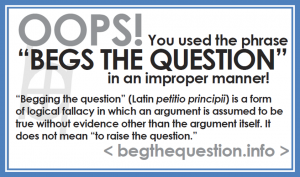Beg pardons, not questions
Certain words and expressions pop up mostly when people are trying (too hard) to sound intelligent. The unconsciously ungrammatical don’t care, so they don’t try.
But others, in an attempt to show how smart they are, show exactly the opposite.
Intellectuals in TV interviews and in print are fond of misusing the phrase: It begs the question.
Incorrect example
“Television commentators and newspaper columnists reach large (and sometimes critical) audiences. Their every grammatical mistake is exposed. It begs the question, why don’t they look things up?”
So why is that wrong? Because this common misuse means “it raises the question.”
It begs the question refers to a logical fallacy in which a statement refers to its own assertion to prove the assertion. It’s a bit like a tautological or circular argument, but not exactly.
Here’s an easy way to tell which is correct. If the expression is followed by the actual question, use raises instead of begs. “It raises the question, why don’t they look things up?”
Correct example
Me: “Although Miss Hereford won the pageant, the judging was unfair because Miss Holstein was the prettiest.”
You: “That begs the question.”
The assertion that Miss H was the prettiest is subjective, and does not prove that the judging was unfair. In this correct case, the implied question is “What’s the support for your claim?”
In the dark underworld of grammar geeks, you can find message boards, websites, and even paraphernalia devoted to the correct use of BTQ (begs the question). You can order T-shirts, coffee mugs, and even thongs emblazoned with the logo and explanation of BTQ. You can download and print cards to hand out to people who misuse it—somewhat like a citizen’s arrest, I guess. Imagine what fun it must be to lie in wait, hoping someone will say it, so you can pounce with your little cards!
I don’t want to know how wearing a BTQ thong proves your dedication or helps to evangelize the point. And the idea of a grammar troll at a party with a pocket full of BTQ cards, wearing a thong, just isn’t an image I want in my head.
Nothing good comes from citizen’s arrests anyway. The offenders won’t heed the message. They will remember that you’re a pompous know-it-all and they want to be as far away from you as possible.
“Begs the question” is so widely misused that people will probably misunderstand if you use it correctly. Just as, in cooking directions, you would not say, “Melt some butter in a pan. About one convex polyhedron bounded by six quadrilateral faces should be enough.” Yes, it’s true that butter does not come in cubes, despite what people call them. But an unfamiliar—though technically correct—phrase is guaranteed to stop communication dead in its tracks.
So do all ye Guardians of the Language just give up? Never. My advice is to avoid even the correct usage of BTQ unless you’re addressing an audience made up entirely of lawyers, philosophers, or grammar geeks. For heaven’s sake, don’t go around handing out BTQ cards, and just call it a stick of butter.
But if you believe it’s OK to use the expression “begs the question” incorrectly because everyone does it anyway and no one knows the difference …
… now that begs the question.




